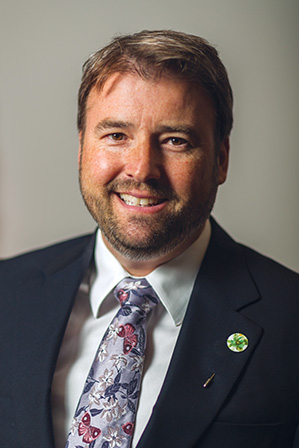You Called?
State VP Voice
BY KENNETH KERO-MENTZ

These are tough times, let’s be honest. And in times of uncertainty, anxiety escalates. Increasingly, folks come to AFSA not just to get answers, but to get reassurance, or at least be heard. It’s what we’re here for, after all.
When members come to us because the department’s policies or procedures are affecting them, I get involved. To raise engagement on an issue, I’ll often send a note to my counterpart in the department. He knows his stuff, which makes my life easier.
We also meet with the Director General’s office about twice a month to discuss a host of issues, mostly big ones like the proposed buyout, the “employee-driven” Redesign (now redesigned into the “Impact Initiative”) or eligible family member (EFM) employment. It gives me an opportunity to share your concerns directly with those who can help.
Over the past few months, we’ve been working on a host of important issues that folks have brought to us. Recent hot-button issues include the need for additional leadership courses at FSI (PT 207), the new tax law (and its impact on Permanent Change of Station costs) and sexual harassment issues.
We raised these issues with the department and, as a result, FSI is looking at ways to add more leadership classes; the department issued a notice indicating that employees will not be taxed on PCS costs; and the Office of Civil Rights expressed interest in starting an open dialogue with employees about sexual harassment.
Over the past year, hundreds of members have shared concerns about the eligible family member hiring freeze and, more recently, changes to the Expanded Professional Associates Program.
We met with HR to dig deeper into the EFM employment issue. While precise details of the thaw remain elusive, bureaus now have more flexibility in determining their needs and moving to fill them. To right this ship will take a while, unfortunately, and tempers are already short.
The proposal to “enhance” the EPAP has been significantly revised, in part based on our submissions and advocacy. For instance, those who have successfully completed 12 months in the program will be grandfathered, eligibility requirements have softened and flexibility in reviewing qualifications has been increased.
Sometimes I wonder if our work is getting us anywhere or if we’re just spinning our wheels. Are our voices being heard?
We’ve also heard from a number of members with concerns about the Zika virus and pregnancy. Recently, we were informed by a member that the department refused to authorize a medevac until the pregnancy was confirmed by an ultrasound, which is typically conducted at about 16 weeks, yet researchers have consistently highlighted the first trimester as the most dangerous for infections involving the Zika virus.
We sent a letter to the department asking that they “seek to minimize the risk to expectant mothers to the maximum extent possible,” especially when the potential consequences are so dire. The department’s response indicated that it will authorize medical travel, lodging and per diem from the day a person tests positive for pregnancy.
Finally, we heard from a member who attended a discussion at FSI at which language instructors said they’ve noticed a change in their students returning from high-threat, high-stress postings—anxiety levels are up, tempers high and attention spans short.
We sent a letter to the department asking FSI to examine this phenomenon further to determine if additional resources should be provided to instructors and students.
These aren’t even the topline issues we’re working on, like intake of new FS members, pushing for improved promotion numbers and fighting for those harmed by the department’s unilateral decision to slash those eligible to receive meritorious step increases from 2014 to 2016.
But these issues are critical to many of us—to expectant parents, language students and anyone concerned about the way our colleagues are treated when placed in harm’s way.
There are days when I leave work feeling a bit crestfallen. I watch as my colleagues trudge toward the Metro, catch a bus or grab a bike, and see similar expressions on the faces of many. Sometimes I wonder if our work is getting us anywhere or if we’re just spinning our wheels. Are our voices being heard?
But one of the best parts of my job is responding to concerns that people send our way, especially those that affect many of our members. It’s what we mean when we say that AFSA is your voice with the department. And we’re happy to help.



